Home > Georgia > Georgia Crops & Livestock > Inside Sunnyland Farms, One of Georgia’s Longest-Running Pecan Farms
Inside Sunnyland Farms, One of Georgia’s Longest-Running Pecan Farms
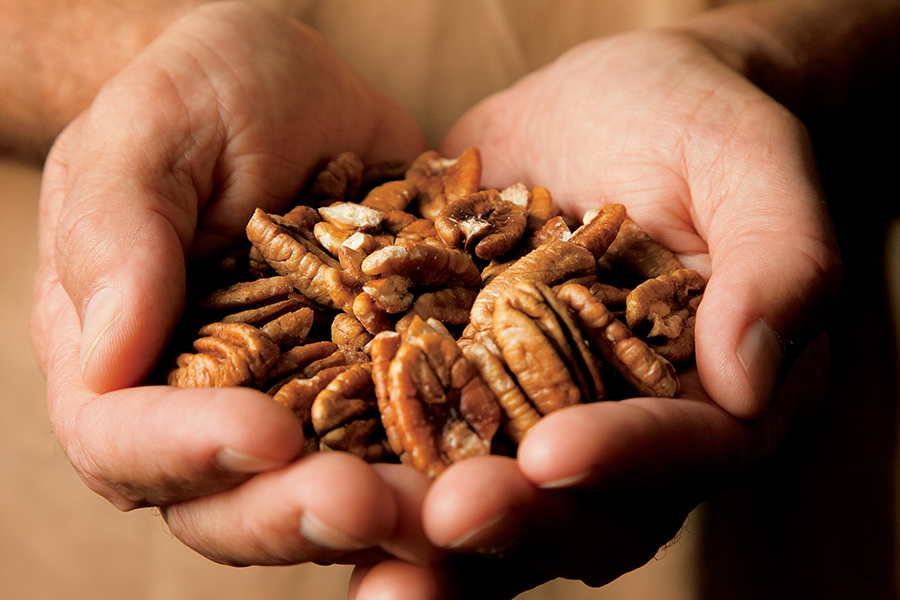
Alex Willson, chief operating officer for his family’s pecan operation, Sunnyland Farms, pronounces the much-debated word this way: puh-con. But even living his entire life in the pecan business, he’s not judging you for articulating it differently. “We say, ‘if you buy them, you can pronounce it however you want,’” he jokes.
Willson’s great-grandfather first developed the land for Willson Farming Company, the agriculture side of Sunnyland, in the heart of southwest Georgia’s pecan country in 1926. At the time, the pecan trees there were 5 years old — and some of them are still alive today. In 1948, Willson’s grandparents started the catalog side of the business, known as Sunnyland Farms. In retrospect, this thinking was far ahead of the times when it comes to diversification on farms.
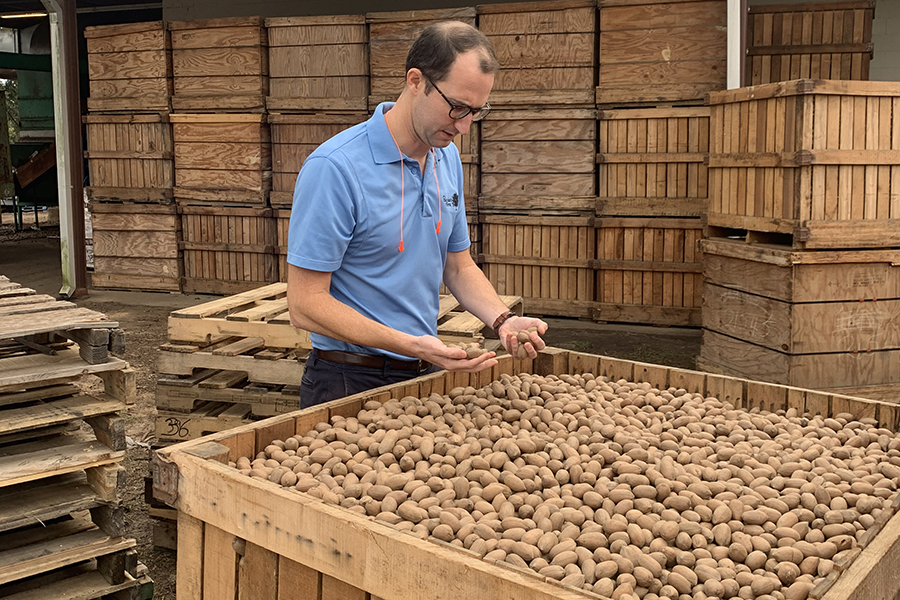
Today, the farm operation occupies about 1,760 acres. About 1,350 of those are planted with trees, Willson says. Over the last 20 to 30 years, the family’s been working to grow the operation, clearing land and adding new orchards. This is where being a pecan farmer isn’t all it’s cracked up to be – think heavy-duty manual labor like picking rocks, digging deep holes and installing irrigation. But the work is rewarding for Willson, who, after a career in finance, returned to the farm five years ago, where he works alongside his parents and his wife.
See more: How Do You Say Pecan? Mapping Food Dialect Trends Across the U.S.
And that catalog business? Anything but dead. On the Monday after Thanksgiving this year, Sunnyland Farms received nearly 600 paper orders via mail, in addition to many phone orders. Over the past few years, however, e-commerce has become the fastest-growing part of the business, and Sunnyland has not only survived but thrived over the last near-century.
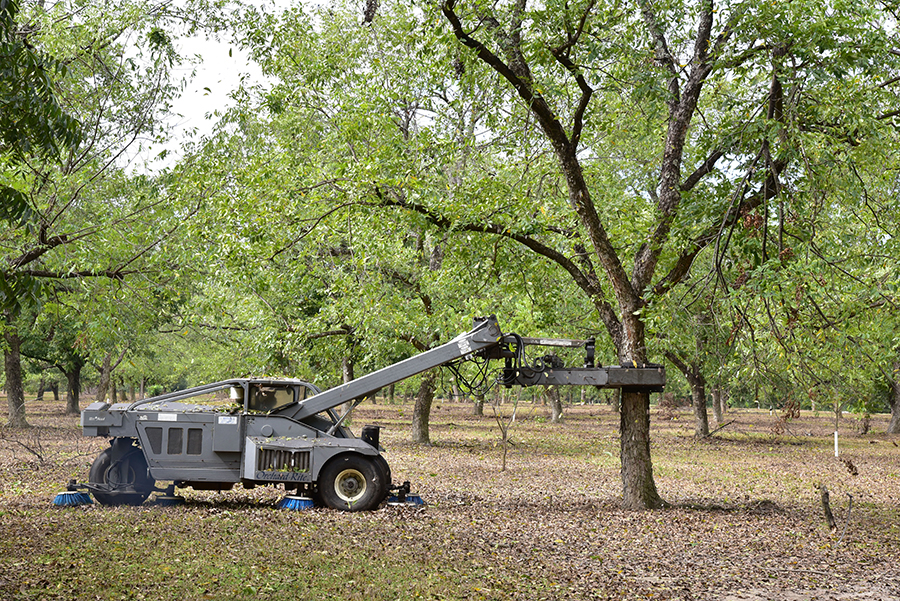
How Pecans Are Harvested
If you’ve never seen pecans being harvested, it’s quite a treat — and will make you that much more appreciative the next time you pick up a bag of pecan pieces from the grocery store.
Traditional harvest starts around mid-October, though some newer varieties of trees start a little earlier, toward the end of September, says Willson. You know the nuts are ready by looking at what’s called the shuck split. Pecans are encased in the familiar brown shell, but that’s inside a big green shuck — sort of like nature’s version of a nesting doll. Once Willson starts seeing the proper split on this outer shell, it’s time for the fun part: shaking the trees. (If you’ve never seen a video of this, head to YouTube ASAP.) Depending on the size of the tree, a robotic arm from an Orchard-Rite tree shaker grabs the tree in several places and makes fast vibrations, shaking the nuts out of the tree.
Once all the nuts are on the ground, “sweeping” comes next. Farmers attach a piece of equipment called a sweeper onto a standard utility tractor, which brushes the nuts (and anything else on the ground, like leaves and rocks) into rows in the center of the pecan tree rows. Then, an attachment that works like a giant leaf blower blows them into neater rows, before a harvester runs over the nuts. The machine has two large brushes that form a V-shape in the front, which funnel in the nuts so the harvester isn’t driving over the nuts and crushing them. “Picture it like the bottom of a vacuum cleaner on the rug function,” Willson explains. “The goal is to separate the nuts from all the other junk you pick up [from the ground.]”
From there, the nuts head to the next step of their journey — a wagon — which transports them to a cleaning plant. Willson’s farm is fortunate to have their own, where they separate out the different sizes of nuts and filter out any that don’t meet quality standards.
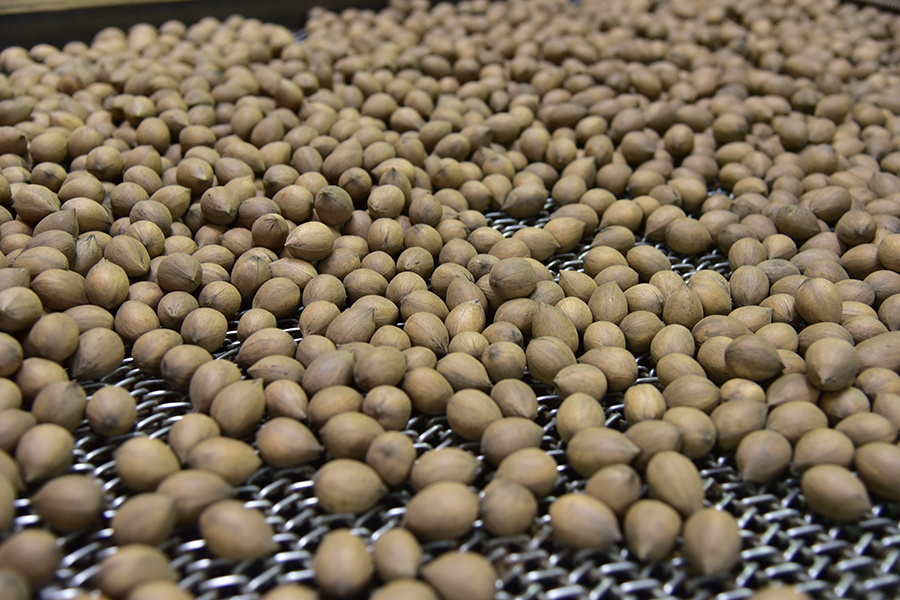
Riding Through the Ups and Downs
Though Georgia is the nation’s top-producing state for pecans, with more than 144,000 acres of trees, the keen focus on quality at Sunnyland helps sets it apart from others. “We have a lot of longevity, and we think we grow a pretty good nut,” Willson says. Perhaps that’s one reason they’ve had a few team members stay for 40 years. “Some of [our employees] have known me since I was a kid,” Willson adds.
It hasn’t necessarily been an easy ride, however. Sunnyland sells the majority of its nuts in the shell through brokers, and a large portion of them are — or used to be — purchased by China. (For the most part, Chinese consumers still buy nuts in a shell, as opposed to Americans, who buy pecans already shelled, Willson notes.) This year, pecan prices have been much lower than usual. Willson attributes this to the country’s’ strained relations with China, heavy tariffs on pecans, increased pecan production worldwide over the past decade and pandemic-induced uncertainty from many customers. “Everyone from Macy’s to grocery stores is trying to streamline their inventory and only carry what they think they can sell,” Willson says. For example, customers who may have purchased 500,000 pounds of pecans in the past may only be buying 100,000 in the current market.
The good news is that 2020 has been a banner year for pecan production for the whole state, Willson says. While that does impact the price, it’s what all farmers needed after Hurricane Michael wiped out many crops two years ago. Though Sunnyland sustained damage to 15% of its pecan trees, it’s been more resilient than others thanks to the e-commerce business. “People are ordering online who’ve never done so before, so that gives us a little bit of a hedge and offsets some of the uncertainty,” Willson says.
See more: 24 State Gift Guides to Help You Shop Local This Holiday Season
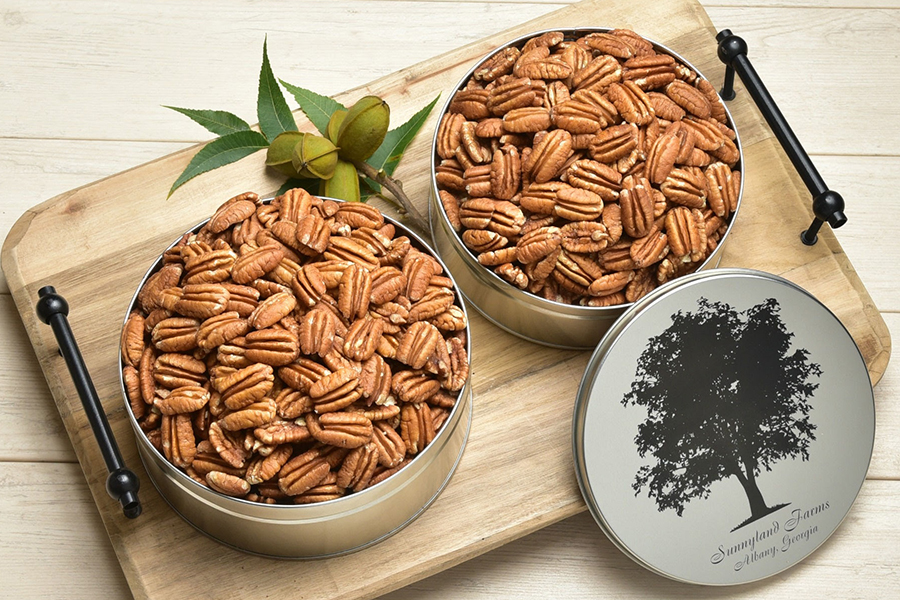
Keeping It Sweet
Walking into Sunnyland’s commercial kitchen is a little like stepping into Willy Wonka’s factory. As if the scent of warm toasted nuts coming out of the oven isn’t enticing enough, the facility also churns out treats like rum crunch cake, chocolate bark, pecan pies, turtles and more. The top sellers for the past 20 years, however, are still the raw pecan halves. Another customer favorite is the Heavenly Mix, which is a blend of toasted, salted pecans, macadamias, almonds and cashews. (For what it’s worth, Willson says he tries not to eat too much of these on a regular basis!). Recently, Sunnyland also added a pecan butter to the mix. Not only is this a delicious spread to use anywhere you’d use regular peanut butter, but it also helps the farm produce less waste: Any of the pecan pieces that aren’t the right size or shape for raw nut products head to the grinder, where they’re judged by taste alone.
Though the farm doesn’t officially have an agritourism arm (yet), Willson says customers are always welcome to stop in if they’re driving through Georgia. He’s also considering converting a small house on the property into a store. Even working as a fourth-generation pecan farmer, day to day life and business at Sunnyland are far from predictable, and he’s constantly thinking about ways to innovate and differentiate. “There’s always a new challenge,” Willson says, “which keeps me interested.”




I love your nuts. I moved and has not received a current catalog.
Loved yr pecans but why y stop the tin cans we used to order
Could you please put me on your catalog list. I live on the Mississippi Gulf Coast and bake a lot of pies throughout the entire year